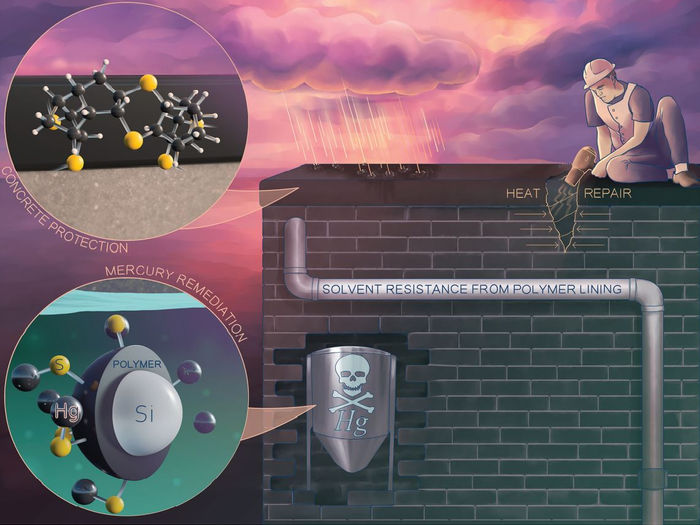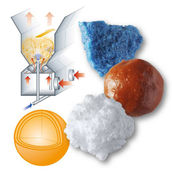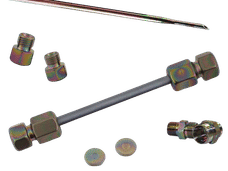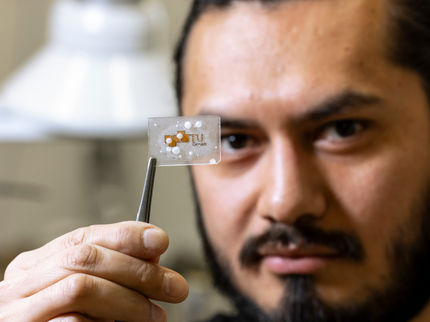Smart coatings in the pipeline
Made from cheap chemicals, this polymer packs a punch
An imaginative approach to polymer surface coating has produced a sustainable way to remove mercury from water – while providing a wide range of protection including for preventing metal corrosion and solvent damage of plastic PVC pipes.

Cover artwork from Polymer Chemistry (March 2022)
Flinders University
The smart coating, made from low-cost chemicals from oil refining and other sources, also can prevent acid and water damage of concrete surfaces and be repaired in situ by a simple heating process, says Flinders University project leader Max Mann.
“Made easily from elemental sulfur and dicyclopentadiene (DCPD is a by-product of petroleum refining), this new coating is multi-functional which gives us wide scope to use it in a wide range of useful ways and for longer lasting industrial products and components,” says Flinders University PhD candidate Mr Mann, lead author of the cover article in this month’s issue of Polymer Chemistry.
“This exciting new area of research extends fundamental chemistry to several practical applications.”
“The method for making the coating is safer than methods previously used for related coatings. The team developed a lower temperature process that prevented runaway reactions,” adds co-author University of Liverpool researcher Dr Bowen Zhang.
Along with its protective powers against corrosion, solvent damage and acid and water damage, the research found the active coating can capture toxic metals such as mercury.
The coating is repairable and scratches and damage can be prepared by the simple application of heat, the Flinders-Liverpool team found.
This process is possible because of the coating’s chemical structure which allows sulfur-sulfur bonds to be broken and re-formed.
Flinders University chemistry Professor Justin Chalker says the research is a significant step forward in multi-functional coatings.
“The unique chemical composition of the smart coating enables protection of substrates, active removal of toxic mercury species from water and oil, and is repairable which ensures its sustainability,” says Matthew Flinders Professor Chalker, from the Institute of Nanoscale Science and Technology at Flinders University.
“The coating is solvent resistant and can also remove mercury from oil and water mixtures, which is of importance to remediation in the petroleum and gas industry.”
Original publication
Other news from the department science
These products might interest you

OCA 200 by DataPhysics
Using contact angle meter to comprehensively characterise wetting behaviour, solids, and liquids
With its intuitive software and as a modular system, the OCA 200 answers to all customers’ needs

Tailor-made products for specific applications by IPC Process Center
Granulates and pellets - we develop and manufacture the perfect solution for you
Agglomeration of powders, pelletising of powders and fluids, coating with melts and polymers

Dursan by SilcoTek
Innovative coating revolutionizes LC analysis
Stainless steel components with the performance of PEEK - inert, robust and cost-effective

Get the chemical industry in your inbox
By submitting this form you agree that LUMITOS AG will send you the newsletter(s) selected above by email. Your data will not be passed on to third parties. Your data will be stored and processed in accordance with our data protection regulations. LUMITOS may contact you by email for the purpose of advertising or market and opinion surveys. You can revoke your consent at any time without giving reasons to LUMITOS AG, Ernst-Augustin-Str. 2, 12489 Berlin, Germany or by e-mail at revoke@lumitos.com with effect for the future. In addition, each email contains a link to unsubscribe from the corresponding newsletter.
Most read news
More news from our other portals
Last viewed contents



























































